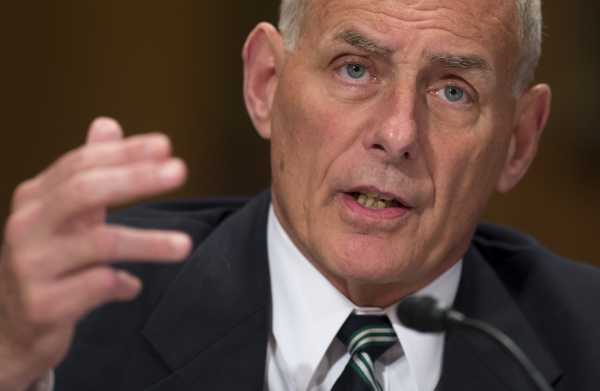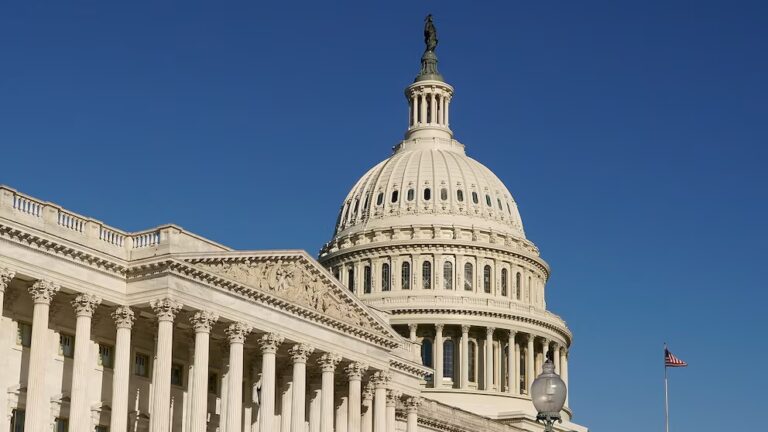
White House Chief of Staff John Kelly has a message for Democrats, and for immigrants: Don’t criticize the White House’s ideas for immigration policy. Be happy, instead, that President Trump is willing to allow even “lazy” immigrants to eventually become US citizens.
“Lazy” was how Kelly described immigrants who were eligible to apply for deportation protections and work permits under the Deferred Action for Childhood Arrivals (DACA) program, but who didn’t have protections at the time Trump shut the program to new applicants in September 2017. It’s estimated that 1.8 million immigrants in the US met the criteria for DACA, but as of September, only 690,000 had it.
The rest, Kelly told reporters Tuesday morning, were “people that some would say were too afraid to sign up, others would say were too lazy to get off their asses.”
And by proposing that those “lazy” immigrants should also be allowed to get legal status and eventual citizenship in the one-page framework the White House released before the State of the Union, Kelly said, the president was being incredibly generous — “beyond what anyone could have imagined.”
In Kelly’s view, Trump’s generosity to DACA-eligible immigrants — even “lazy” ones — represents a huge compromise on the White House’s part. And he thinks it’s unfair that Democrats aren’t rushing to embrace the White House framework, and cave on the demands the administration is making — $25 billion in funding for a border wall and substantial cuts to future legal immigration (by slashing family-based immigration without any increases in other immigration categories to compensate) — in return.
Trump has painted himself as the true champion of DACA recipients, someone who genuinely wants to help immigrants who’ve grown up in the US become citizens. But to Kelly, that’s a concession. This is why the administration has struggled to move negotiations forward on DACA: Trump and his staff can’t get on the same page about whether legalization for anyone is something they really want — or something they’ll grudgingly grant in exchange for something they really want.
Kelly is exaggerating the White House’s “generosity”
Kelly is alluding to an argument Trump made during the State of the Union: that President Trump is being nicer to unauthorized immigrants who grew up in the United States than President Obama was. Obama created DACA, which was allowing 690,000 people to work legally as of September 2017; President Trump, on the other hand, proposed a framework that would allow all 1.8 million immigrants to apply for legal status and eventually citizenship.
As a matter of policy, there are a few problems with this. First of all, we don’t yet know what the White House is actually proposing on legalization. The framework doesn’t include any eligibility requirements. People have assumed that the proposal would cover anyone eligible for DACA, around 1.8 million people, and that’s the number the White House uses — but we don’t actually know this for sure.
Second, if the standard is “endorsing a bill,” Obama should get credit for endorsing both the DREAM Act in 2010 (which would have legalized about as many immigrants as Trump’s proposal) and the comprehensive immigration reform proposal he supported in 2013 (which would have legalized many times more). Third, more than 690,000 people have had DACA at some point over the course of the five years the program was fully in effect, but some of them were unable to renew their two-year permits.
Arguably most importantly, Trump and Kelly are both comparing apples to oranges here — they’re comparing the number of people who could sign up for their program to the number of people who did sign up for Obama’s. They’re comparing DACA, for which 1.8 million were eligible but around half of whom applied, to their framework, in which 1.8 million are eligible and an unknown number might apply.
There are all sorts of reasons people didn’t apply for (or were unable to renew) DACA, and most of those reasons would stop them from signing up for Trump’s proposal as well. In a survey of unauthorized immigrant millennials, Tom Wong of UC San Diego found that the most common reason for not applying for DACA was cost: $495 to apply for DACA, and $495 again every two years to renew. Other immigrants weren’t aware they were eligible, or weren’t able to find an affordable lawyer — or any lawyer — who could vet their application and make sure they hadn’t made any mistakes.
And yes, some of them were afraid. They were afraid because any mistakes on their application could result in their arrest and potential deportation. They were afraid because even if they successfully got DACA, their parents — many of whom lived at addresses the federal government now had via DACA applications — would still be vulnerable to arrest and deportation. And they were afraid because they knew that DACA was temporary, and that should a future president end the program, as Trump did, they would be vulnerable to deportation once again.
(The Trump administration has assured that people who lose DACA won’t be a “priority” for deportation, but ICE agents are still picking some of them up — and while the administration claims they won’t send lists of ex-DACA recipients’ addresses to Immigration and Customs Enforcement, ICE is still allowed to request information from a DACA application if it thinks someone is important to target.)
Kelly mocks that fear by calling it an excuse for laziness. And by doing that, he shows he doesn’t fully understand how different it feels to have no protection, temporary protection, and permanent immigration status. In other words, he doesn’t actually understand the stakes of the proposal he’s calling “generous” — much less why the people whom it’s supposed to be “generous” to are rejecting it.
Sourse: vox.com






